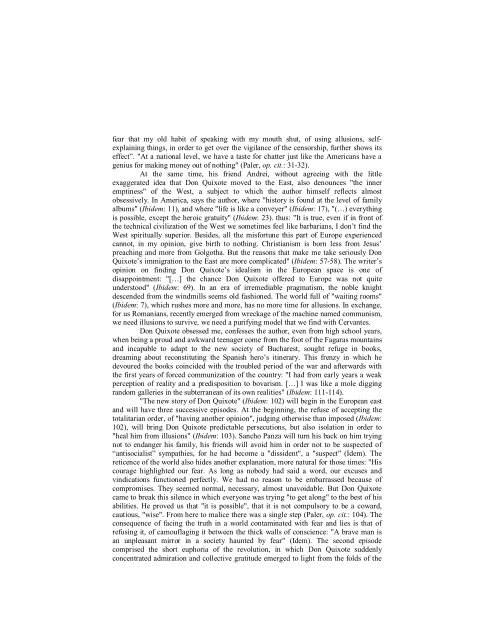language and literature european landmarks of identity
language and literature european landmarks of identity
language and literature european landmarks of identity
Create successful ePaper yourself
Turn your PDF publications into a flip-book with our unique Google optimized e-Paper software.
fear that my old habit <strong>of</strong> speaking with my mouth shut, <strong>of</strong> using allusions, selfexplaining<br />
things, in order to get over the vigilance <strong>of</strong> the censorship, further shows its<br />
effect”. "At a national level, we have a taste for chatter just like the Americans have a<br />
genius for making money out <strong>of</strong> nothing" (Paler, op. cit.: 31-32).<br />
At the same time, his friend Andrei, without agreeing with the little<br />
exaggerated idea that Don Quixote moved to the East, also denounces "the inner<br />
emptiness" <strong>of</strong> the West, a subject to which the author himself reflects almost<br />
obsessively. In America, says the author, where "history is found at the level <strong>of</strong> family<br />
albums" (Ibidem: 11), <strong>and</strong> where "life is like a conveyer" (Ibidem: 17), "(…) everything<br />
is possible, except the heroic gratuity" (Ibidem: 23). thus: "It is true, even if in front <strong>of</strong><br />
the technical civilization <strong>of</strong> the West we sometimes feel like barbarians, I don’t find the<br />
West spiritually superior. Besides, all the misfortune this part <strong>of</strong> Europe experienced<br />
cannot, in my opinion, give birth to nothing. Christianism is born less from Jesus’<br />
preaching <strong>and</strong> more from Golgotha. But the reasons that make me take seriously Don<br />
Quixote’s immigration to the East are more complicated" (Ibidem: 57-58). The writer’s<br />
opinion on finding Don Quixote’s idealism in the European space is one <strong>of</strong><br />
disappointment: "[…] the chance Don Quixote <strong>of</strong>fered to Europe was not quite<br />
understood" (Ibidem: 69). In an era <strong>of</strong> irremediable pragmatism, the noble knight<br />
descended from the windmills seems old fashioned. The world full <strong>of</strong> "waiting rooms"<br />
(Ibidem: 7), which rushes more <strong>and</strong> more, has no more time for allusions. In exchange,<br />
for us Romanians, recently emerged from wreckage <strong>of</strong> the machine named communism,<br />
we need illusions to survive, we need a purifying model that we find with Cervantes.<br />
Don Quixote obsessed me, confesses the author, even from high school years,<br />
when being a proud <strong>and</strong> awkward teenager come from the foot <strong>of</strong> the Fagaras mountains<br />
<strong>and</strong> incapable to adapt to the new society <strong>of</strong> Bucharest, sought refuge in books,<br />
dreaming about reconstituting the Spanish hero’s itinerary. This frenzy in which he<br />
devoured the books coincided with the troubled period <strong>of</strong> the war <strong>and</strong> afterwards with<br />
the first years <strong>of</strong> forced communization <strong>of</strong> the country: "I had from early years a weak<br />
perception <strong>of</strong> reality <strong>and</strong> a predisposition to bovarism. […] I was like a mole digging<br />
r<strong>and</strong>om galleries in the subterranean <strong>of</strong> its own realities" (Ibidem: 111-114).<br />
"The new story <strong>of</strong> Don Quixote" (Ibidem: 102) will begin in the European east<br />
<strong>and</strong> will have three successive episodes. At the beginning, the refuse <strong>of</strong> accepting the<br />
totalitarian order, <strong>of</strong> "having another opinion", judging otherwise than imposed (Ibidem:<br />
102), will bring Don Quixote predictable persecutions, but also isolation in order to<br />
"heal him from illusions" (Ibidem: 103). Sancho Panza will turn his back on him trying<br />
not to endanger his family, his friends will avoid him in order not to be suspected <strong>of</strong><br />
“antisocialist” sympathies, for he had become a "dissident", a "suspect" (Idem). The<br />
reticence <strong>of</strong> the world also hides another explanation, more natural for those times: "His<br />
courage highlighted our fear. As long as nobody had said a word, our excuses <strong>and</strong><br />
vindications functioned perfectly. We had no reason to be embarrassed because <strong>of</strong><br />
compromises. They seemed normal, necessary, almost unavoidable. But Don Quixote<br />
came to break this silence in which everyone was trying "to get along" to the best <strong>of</strong> his<br />
abilities. He proved us that "it is possible", that it is not compulsory to be a coward,<br />
cautious, "wise". From here to malice there was a single step (Paler, op. cit.: 104). The<br />
consequence <strong>of</strong> facing the truth in a world contaminated with fear <strong>and</strong> lies is that <strong>of</strong><br />
refusing it, <strong>of</strong> camouflaging it between the thick walls <strong>of</strong> conscience: "A brave man is<br />
an unpleasant mirror in a society haunted by fear" (Idem). The second episode<br />
comprised the short euphoria <strong>of</strong> the revolution, in which Don Quixote suddenly<br />
concentrated admiration <strong>and</strong> collective gratitude emerged to light from the folds <strong>of</strong> the


